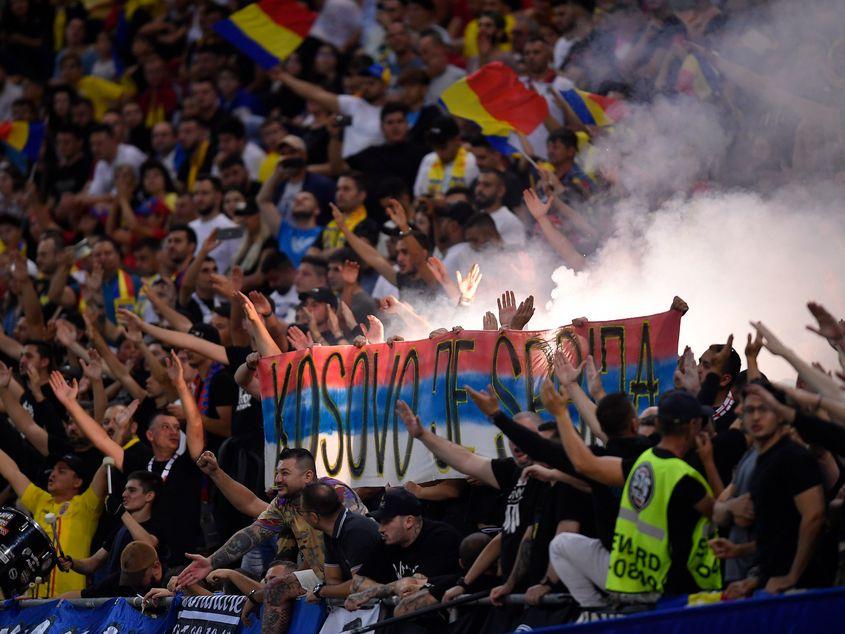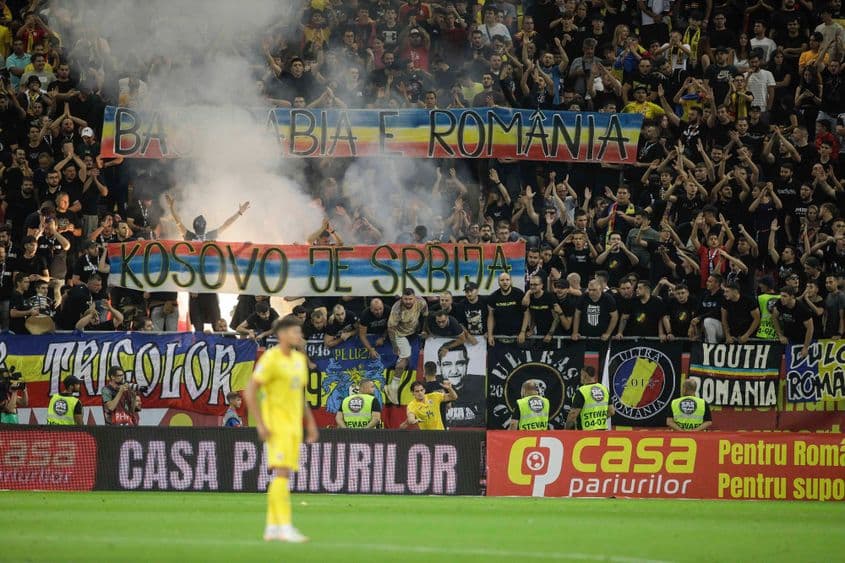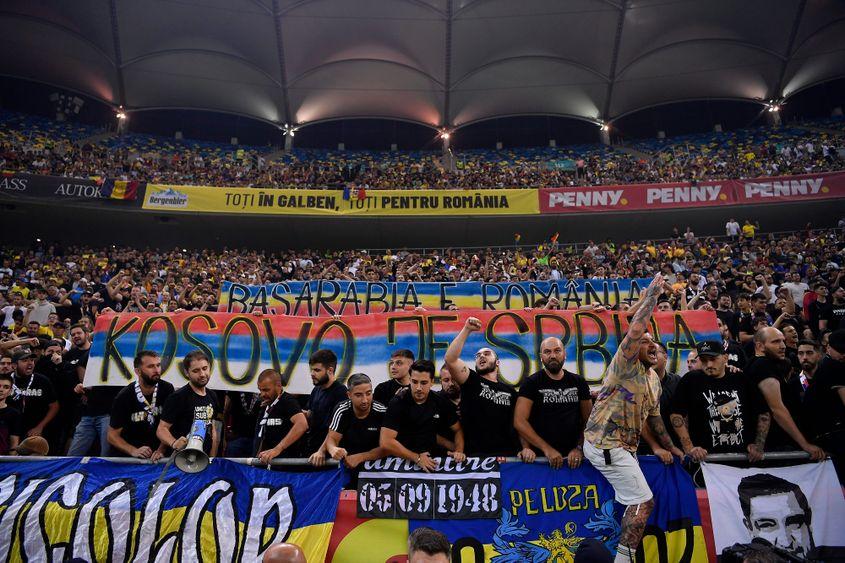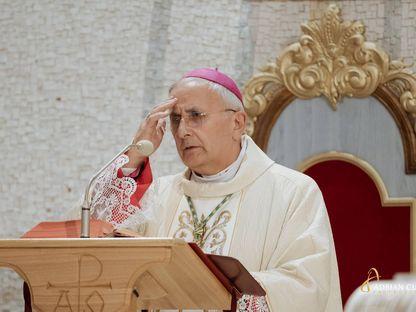The group of hooligans who started the scandal at the football match between Romania and Kosovo in the European Championship 2024 preliminaries. Photo: Inquam Photos / Alex Nicodim

The group of hooligans who started the scandal at the football match between Romania and Kosovo in the European Championship 2024 preliminaries. Photo: Inquam Photos / Alex Nicodim
14/09/2023
Stadium geopolitics: how the media in Serbia and Kosovo reacted to the scandal caused by Romanian ultras in Bucharest
Nurturing nationalism in stadiums across the Balkans is not uncommon. When it comes to Serbia, there is hardly a match without the chanting of "Kosovo is Serbia". Foreign fans are aware of this as well. Ultras from countries that do not recognize Kosovo, such as Slovakia, Greece, Cyprus, and Romania, never miss an opportunity to show their devotion to the home fans by chanting about Serbian Kosovo.
One recent exemple is the Cypriot club APOEL's visit to the Serbian football club Vojvodina, as part of the Conference League qualifiers. The first thing the Cypriot club's fans started shouting when they entered the Serbian stadium was "Kosovo is Serbia". The hosts began to excitedly applaud and greet the visiting fans before joining in the chanting.
Romanian ultras interrupted the Kosovo match with nationalist chants. Photo: Inquam Photos / George Călin
Since the hardcore fan groups in most countries are generally far-right nationalist, supporting each other in nurturing nationalism seems like a logical occurrence in stadiums. An average fan from Serbia probably doesn't know where Bessarabia is located on the geographical map. However, if they hear Romanian fans chanting that Kosovo is Serbia, they will gladly join in with „Bessarabia is Romania”.
It's about a sense of unity, which represents one of the main values of ultras groups. If one group supports the nationalist tendencies of another group, whatever they may be, there won't be conflict, and the groups will perceive each other as "brothers". If there is no mutual understanding, the groups will clash both in the stands and in the streets, seeking different ways to humiliate the rival group.
How did Serbian and Kosovo media react to the incidents in Romania?
Immediately after the Romania - Kosovo match was interrupted due to the chanting of nationalistic slogans that made the Kosovo players leave the field, incendiary statements began to spread in the media in Kosovo. As the established Balkan narrative of hatred dictates, reporting couldn't go on without mentioning "fascism" and singling out individuals who would be publicly shamed on behalf of the entire nation.
One Kosovo politician stated that there would be no surrender to "small turbofolk fascists" (turbofolk is a term for Serbian mainstream music), which was echoed by several media outlets (such as Kosovarja, Gazeta Express or Albanian Post).
Other media outlets vied to find individuals from the Romanian political scene to connect with nationalist slogans and easily found statements from right-wing politician George Simion (one of the founders of the group "Uniți sub Tricolor", that caused the scandal) that fit perfectly into their narrative.
On the other hand, in most Serbian media, the Romanian fans' chanting was, expectedly, greeted with enthusiasm.
Mulți ne citesc, puțini ne susțin. Fără ajutorul tău, nu putem continua să scriem astfel de articole. Cu doar 5 euro pe lună ne poți ajuta mai mult decât crezi și poți face diferența chiar acum!
The main narrative of Serbian tabloid pro-government media with pronounced nationalist editorial policies boiled down to mocking the Kosovo players for leaving the match due to messages from the stands. "Shiptars ran off the field because of 'Kosovo is Serbia'" was reported by Informer in its print edition, while on its website, this tabloid also attempted to justify the behavior of Romanian ultras in a news article titled "Shiptar grabbed his private parts! Goalkeeper shamelessly provoked Romanians!". The term "Shiptar" is a derogatory name for Albanians in Serbian language and represents hate speech, but pro-government tabloids use it freely whenever it's necessary to stoke interethnic hatred.
One Serbian portal characterized the events at the Romania vs. Kosovo match as "shameful". This would have been perfectly fine if the "shame" in the text of this portal referred to the behavior of the ultras. However, according to the Sportal, the only shameful thing was the behavior of the Romanian announcer at the match, as he pleaded with fans to remove controversial banners and stop chanting.
What probably best illustrates how both Kosovo and Serbian media superficially reported on the incidents at the match in Romania is that the banner "Bessarabia is Romania" was hardly mentioned. It remains clear that local media only care about stoking the already boiling pot of domestic nationalism. The phenomenon of nationalism in stadiums is something that doesn't attract clicks, profit, or virality, so unprofessional media neglect it, even though it is the very core of the issue they are reporting on.
The group of ultras who started the scandal at the football match between Romania and Kosovo in the European Championship 2024 preliminaries. Photo: Inquam Photos / Alex Nicodim
This is hardly the first act of the show
Predator in Robes: The Diocese of Iași and the Vatican Buried a Sexual Assault Committed by a Catholic Priest Against a Minor in Bacău, Failing to Alert Prosecutors
A Roman Catholic priest abused a 13-year-old girl in the parish where he served in Bacău County: the bishop of Iași knew about it, sent the case to the Vatican, and applied canonical sanctions, but did not notify the authorities, who only intervened later and sentenced him to prison.
Less than a year ago, in Frankfurt, the groups for the European Football Championship qualifiers were determined by draw. The Romanian football public probably breathed a sigh of relief as the national team was given a relatively easy task. However, even then, football connoisseurs and those familiar with all the circumstances surrounding this game could sense a potential problem. Romania found itself in a group with the Kosovo national team, a territory that declared independence from Serbia in 2008, but that is still not recognized by many countries around the world, including Romania.
However, when members of the Romanian ultras group "Uniți sub tricolor" visited Serbia in previous years for their national team's away matches, the same nationalistic slogans, to which Serbian fans are also inclined, echoed through the stadium. "Kosovo is Serbia" and "Bessarabia is Romania" were the unified chants ultras shouted both in Belgrade and in Bucharest in 2018.
However, in June of this year, Romanian fans headed to Kosovo to support their team, and that's when the tensions started climbing, culminating in the recently played match between Romania and Kosovo in Bucharest. Before arriving in Pristina, the capital of the self-proclaimed Republic of Kosovo, Romanian fans visited Belgrade and took the opportunity to immediately express their opinion about their national team's visit to Kosovo. "Made-up countries, fake football, for us, they don't mean anything at all” stated the banner which Romanian fans photographed themselves with in front of the Saint Sava Temple in Belgrade.
Un newsletter pentru cititori curioși și inteligenți.
Sunt curios
This provocation led to the Romanian anthem being booed so loudly at the match in Kosovo that it could hardly be heard. At the end of the match, Romanian fans were beaten, and then expelled from the stadium by the police and security because of chanting „Kosovo is Serbia”.
Incidents continued three months later in Bucharest. The match was interrupted due to the same nationalistic chanting that had been tolerated in Serbia and Romania five years earlier, then resumed, and ultimately ended in Romania's victory.
The Romanian Football Federation condemned the behavior of the "small group of so-called fans", while the Football Federation of Kosovo asked UEFA to take appropriate measures against the Romanian national team.
The same chanting in Serbia and Romania five years ago didn't bother the fans, but UEFA punished the Romanian national team back then, and the same could happen now. Stadium geopolitics sometimes reflects the political games behind the scenes more accurately than we would like.

Avem nevoie de ajutorul tău!
Mulți ne citesc, puțini ne susțin. Asta e realitatea. Dar jurnalismul independent și de serviciu public nu se face cu aer, nici cu încurajări, și mai ales nici cu bani de la partide, politicieni sau industriile care creează dependență. Se face, în primul rând, cu bani de la cititori, adică de cei care sunt informați corect, cu mari eforturi, de puținii jurnaliști corecți care au mai rămas în România.
De aceea, este vital pentru noi să fim susținuți de cititorii noștri.
Dacă ne susții cu o sumă mică pe lună sau prin redirecționarea a 3.5% din impozitul tău pe venit, noi vom putea să-ți oferim în continuare jurnalism independent, onest, care merge în profunzime, să ne continuăm lupta contra corupției, plagiatelor, dezinformării, poluării, să facem reportaje imersive despre România reală și să scriem despre oamenii care o transformă în bine. Să dăm zgomotul la o parte și să-ți arătăm ce merită cu adevărat știut din ce se întâmplă în jur.
Ne poți ajuta chiar acum. Orice sumă contează, dar faptul că devii și rămâi abonat PressOne face toată diferența. Poți folosi direct caseta de mai jos sau accesa pagina Susține pentru alte modalități în care ne poți sprijini.
Vrei să ne ajuți? Orice sumă contează.
Share this




